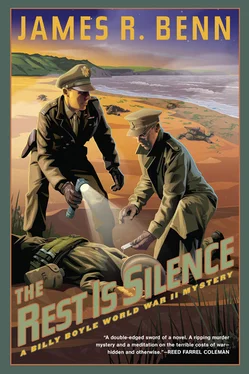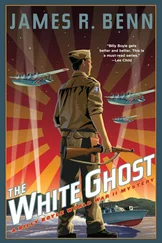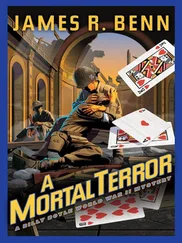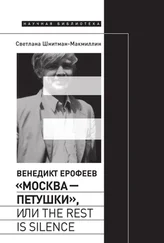James Benn - The Rest Is Silence
Здесь есть возможность читать онлайн «James Benn - The Rest Is Silence» весь текст электронной книги совершенно бесплатно (целиком полную версию без сокращений). В некоторых случаях можно слушать аудио, скачать через торрент в формате fb2 и присутствует краткое содержание. Год выпуска: 2014, ISBN: 2014, Издательство: Random House Publisher Services, Жанр: Шпионский детектив, на английском языке. Описание произведения, (предисловие) а так же отзывы посетителей доступны на портале библиотеки ЛибКат.
- Название:The Rest Is Silence
- Автор:
- Издательство:Random House Publisher Services
- Жанр:
- Год:2014
- ISBN:978-1-61695-267-9
- Рейтинг книги:3 / 5. Голосов: 1
-
Избранное:Добавить в избранное
- Отзывы:
-
Ваша оценка:
- 60
- 1
- 2
- 3
- 4
- 5
The Rest Is Silence: краткое содержание, описание и аннотация
Предлагаем к чтению аннотацию, описание, краткое содержание или предисловие (зависит от того, что написал сам автор книги «The Rest Is Silence»). Если вы не нашли необходимую информацию о книге — напишите в комментариях, мы постараемся отыскать её.
The Rest Is Silence — читать онлайн бесплатно полную книгу (весь текст) целиком
Ниже представлен текст книги, разбитый по страницам. Система сохранения места последней прочитанной страницы, позволяет с удобством читать онлайн бесплатно книгу «The Rest Is Silence», без необходимости каждый раз заново искать на чём Вы остановились. Поставьте закладку, и сможете в любой момент перейти на страницу, на которой закончили чтение.
Интервал:
Закладка:
“That’s not Tom’s problem,” Grange said, settling back in his chair and stuffing his pipe with tobacco. Quick was upstairs in his quarters, with David Martindale keeping him company. Kaz was on the telephone, reporting in to Colonel Harding. I was stuck trying to understand Tom Quick.
“He kept talking about bomb loads. Blockbusters, that sort of thing,” I said.
“That’s because he was a bombardier,” Grange said. “They called those big bombs ‘cookies,’ as if they were children at play. I suppose it makes it easier, somehow, to change the name of the thing.” He puffed on his pipe, studying the glow of the coals as if it were preferable to thinking about the obliteration of cities.
“So what is it, guilt?” I asked.
“Nothing so simple,” Grange said, blowing smoke toward the ceiling. “Tom was a good man on the force, the kind of constable you know will move up the ranks. But then the war came along, and he joined the RAF as soon as he could. Wanted to be a pilot, but washed out for some reason, so he made bombardier instead. He came home on leave after his first five missions. He said they’d been easy, mainly against airfields and other German installations in France.”
“Military targets,” I said.
“Yes. The RAF hadn’t yet begun the nighttime bombing. He came to visit and let slip that they were going to hit Bremen next, as soon as he reported back. He shouldn’t have said anything, but he was terribly excited about finally bringing the war home to Germany, after all England had suffered. I scolded him, of course, and swore I wouldn’t say a thing.”
“Where was home?” I asked. “Not the bachelor quarters here.”
“No. Tom had a lovely wife and two children, both little girls. They’d moved to Plymouth to stay with her parents when Tom joined up. It was April 1941 when he had that leave. He returned to duty, and that very night he flew off with his squadron, and they dropped their thousand-pound bombs on Bremen. At the same time, the Germans hit Plymouth. Scored a direct hit on the air-raid shelter in Portland Square. Seventy-two people were killed in that one shelter.”
“Tom’s wife and children among them,” I said, a terrible understanding growing in my mind.
“Yes,” Grange said, staring at his pipe. It had gone out. “The night he first dropped his bombload on a German city. He was devastated. Almost broken by it, as any man would be. Others might seek revenge, delight in wreaking havoc on the people who had done such a thing. But there was no sign of that with Tom. He had compassionate leave to bury his family, of course, and we all went to the funeral. Going to funerals was almost a full-time job during the Blitz.”
“How did Tom react?”
“Like the man he was. He returned to duty and completed his thirty missions. Then he fell apart, completely. Catatonic for a while. I spoke to his RAF doctor before I took him on here, and he said Tom felt he was murdering his own family every time they bombed a city. Which by then was nearly every mission. It didn’t help that he lost a good friend on his last flight. His rear gunner, I think it was.”
“Which is why you took him on as a War Reserve Constable,” I said, wondering if that was the Freddie he’d mentioned. “But not a regular officer.”
“Yes, I owed him that much. I try to pair him up with others, keep him busy. I don’t think the county constable would ever take him back as a regular if he saw his medical file. But I have some latitude with the War Reserve fellows, so I did what I thought best. He tells people he was invalided out of the service because of his leg wounds. He did take some shrapnel, but nothing serious. It’s a convenient and kind lie we all go along with.”
“Will he be okay?” I asked.
“He’ll snap out of it; he always does,” Grange said. “But if you mean will he ever be the old Tom Quick again? No, that man’s long gone.”
I left Inspector Grange to his pipe and wandered into the office Kaz had been given to make his call to SHAEF. He was just hanging up the telephone. “Colonel Harding says he agrees, the body is more than likely connected to Sabini. He told us to stay here until at least tomorrow. General Eisenhower may be coming down to Slapton Sands to watch a training exercise. I gave him the number for Ashcroft.”
“Okay,” I said. “Let’s collect David and head back.” I gave Kaz the basics about Tom Quick as we took the stairs to the constable’s quarters. Quick had a small but comfortable room with a dresser, easy chair, table, and bed. Not a place you’d want to spend every waking hour, but not bad for a good night’s sleep after walking a beat. I wondered where he’d go when the war was over-but the way things were going, that was a long time off.
“Sorry I caused such a fuss,” Tom said, sitting up in his bed, his tunic loosened.
“Nothing to worry about, Tom,” David said. “Rest up. They’ll have you back on the job in the morning. See you tomorrow night for a pint, all right?”
“Yes,” Tom said. “I’ll look forward to it.” They shook hands, two scarred airmen. If I had to choose at that moment which scar I’d carry if I had to, the Spitfire would win out over the Lancaster.
We drove back to Ashcroft in silence. A cool breeze blew the remaining clouds away, revealing achingly blue skies. A beautiful day. Sabini and his goons were on a police surgeon’s slab, Tom was coming out of his stupor, and David had found a new friend, someone who might understand what he’d been through. And we didn’t have to worry about German spies sneaking ashore at Slapton Sands.
The day could have gone worse.
“There you are, David,” Meredith said as she walked through the door, turning away from a man holding a woven basket heaped with produce. “Helen was asking about you. You should tell the poor girl where you are. Baron, Captain, did you kidnap our David again?”
“We’ve had quite an adventure,” David said. “Are we in time for tea?”
“Just,” Meredith said. “I’ll tell Mrs. Dudley you’ll be joining us. Crawford, I’ll take the strawberries.” She went off, clutching the basket of bright red berries.
“Crawford, these are our guests, Captain Boyle and Baron Kazimierz,” David said, a bit quickly, I thought. Was he taken aback by Meredith’s abrupt departure, or her comments about Helen? “They have been quite impressed by our food here. Those strawberries look marvelous.”
“Gentlemen,” Crawford said, giving the hint of a bow. “I’m pleased to hear it. The greenhouse lets us get an early start on things.”
“It must be a change from fishing as a livelihood,” I said.
Crawford wore a neatly trimmed moustache on his broad face, his brown hair thick and well Brylcreemed. He was square jawed, with a tan from working outdoors and telltale crow’s feet around his eyes from squinting into the sun’s harsh glare on salt water. He wore wool pants and an open vest over a blue shirt, and his shoes were scuffed but clean.
“I’d prefer to be out on the water, but the government took my land and my mooring, and I lost my boat in a storm. Got pushed up on the rocks at Start Point in a gale, and that was that. I count myself lucky to have Ashcroft, I do.”
“I know the family feels the same,” David said. Crawford nodded and left through the front door.
“I applaud the egalitarianism of Ashcroft House,” Kaz said. “Many country homes would not allow a member of the staff to use the front door. Nor would it even occur to the staff to do so.”
“Well, the Sutcliffe family is not hereditary aristocracy. More hard-working upper-middle-class types. Sir Rupert was knighted for his work in India, but that ends with him. The same with the Pembertons,” David said. “It would be sheer idiocy to try to keep Ashcroft in the style of the last century. It would bankrupt the place. The war taxes are hard enough on the old boy.”
Читать дальшеИнтервал:
Закладка:
Похожие книги на «The Rest Is Silence»
Представляем Вашему вниманию похожие книги на «The Rest Is Silence» списком для выбора. Мы отобрали схожую по названию и смыслу литературу в надежде предоставить читателям больше вариантов отыскать новые, интересные, ещё непрочитанные произведения.
Обсуждение, отзывы о книге «The Rest Is Silence» и просто собственные мнения читателей. Оставьте ваши комментарии, напишите, что Вы думаете о произведении, его смысле или главных героях. Укажите что конкретно понравилось, а что нет, и почему Вы так считаете.












